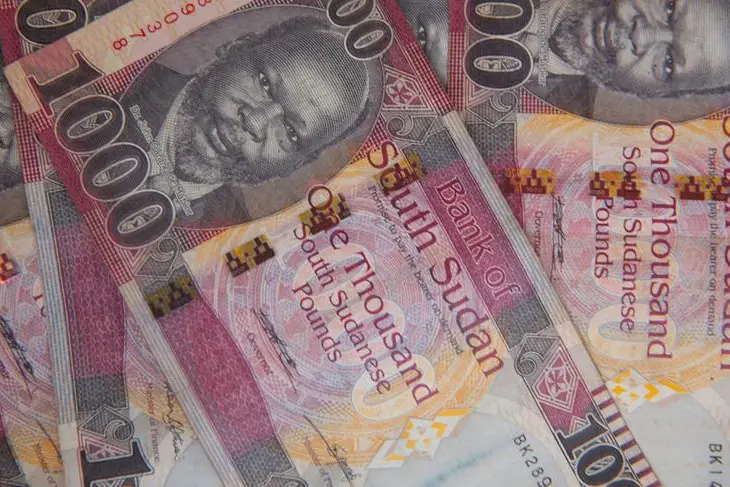PHOTO
The Bank of South Sudan (BoSS) expects more inflationary pressures and weakening of the South Sudanese pound as a result of the continuous decline in forex reserves, highlighting the depth of economic woes facing the nation ahead of the general election scheduled for December this year.
Juba is grappling with a shortage of dollars as a result of declining revenues from oil production-the nation’s chief revenue earner, on depleted wells and military conflict in the neighbouring Sudan.
BoSS Governor James Alic Garang says oil reserves are at “historic low” levels as a result of geopolitical tensions, including the raging conflict in neighbouring Sudan and the Israel-Hamas war.
Dr Garang says the low levels of reserves have huge implications for the country’s balance of payments, with consequences for currency depreciation and high volatility manifested in prices of goods and services.
Read: South Sudan oil shrinks, economy tanks“Geopolitical tensions, including the raging war in neighbouring Sudan, have affected our pipeline to Port Sudan, and the Hamas-Israeli war has disrupted the major trading route in the Gulf of Eden, where shipment of our crude oil takes place, posing a challenge to South Sudan’s economic outlook,” Dr Garang told the 27th Ordinary Meeting of Monetary Affairs Committee of the East African Community (EAC) in Juba.“As a result, our reserves are at historically low levels. These have huge implications for balance of payments, with negative consequences for currency depreciation and high volatility manifested in prices of goods and services. We hasten to add that South Sudan is a net importer, which creates unprecedented pressure on the external sector and trade balance.”He noted that the blockade on the Red Sea has jeopardised crude oil exports, leading to low reserves.“That said, we are committed to rebuilding our international reserves to meet the EAC convergence criteria of 4.5 months of import cover,” the central bank boss said.
He, however, did not disclose the current level of the country’s forex reserves, but available World Bank data shows that South Sudan’s total forex reserves was estimated at $183.61 million, or 0.4 months of import cover, in 2020, with hopes of recovering to 0.5 months of import cover in 2022/2023.
Oil exports constitute about 29 percent of the value of the country’s Gross Domestic product.
Read: EAC’s ‘fragile’ states set for fastest GDP growthJuba’s total daily average oil production stood at 141,000 barrels per day, against a projected volume of 151,000 barrels per day during the 2022/2023 fiscal year.
Consumer price inflation averaged 82.7 percent in the 10 years to 2022, according to global macroeconomic forecasting firm, FocusEconomics, while the Bank of South Sudan puts the general rise in the prices of goods and services in the country at 13.52 percent in 2023.
Economists at the UK-based Oxford Economics say South Sudan’s oil production faces more headwinds this year, owing to the volatile political situation in Juba coupled with global oil prices that are expected to further fall to an average of $79 per barrel in 2024 from $82 per barrel in 2023.
In February 2023, the BoSS suspended the use of US dollars in the local economy, saying the use of foreign currency reduces demand for the domestic currency and places huge pressure on the forex demand, leads to fuel speculation, and inflation.
The regulator also argued that the rapid expansion in dollar deposits and loans is likely to increase the risk on the loan portfolio in the domestic banks.
Multiple challengesMost transactions in the country were initially carried out in dollars, largely due to hyperinflation and the volatility of the local currency.
According to the International Monetary Fund, Juba’s risk of debt distress remains high, owing in large part to high debt service costs, low levels of foreign exchange reserves and fiscal buffers.
Read: Kiir sacks finance minister amid economic crisisThe South Sudanese authorities are facing multiple challenges, including significant spillovers from the conflict in neighbouring Sudan, flooding, declining humanitarian assistance, the incorporation of newly constituted security forces into the payroll, and the need to finance elections planned for December this year.
The need to remain cautious on contracting new debt has also contributed to a continued reliance on costly oil advances, according to IMF.
The conflict in Sudan has created logistical challenges, increased the cost of oil production, and exacerbated an already difficult humanitarian situation in South Sudan, with over 400,000 refugees having arrived in South Sudan as of early December 2023. © Copyright 2022 Nation Media Group. All Rights Reserved. Provided by SyndiGate Media Inc. (Syndigate.info).





















